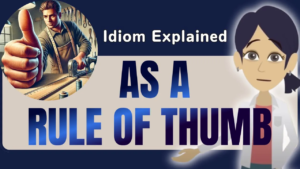Ever wondered why English speakers talk about “getting their head down” when they’re clearly not ducking under something?
- To focus intensely and work diligently on a task without distraction
- (British English) To rest or take a nap
Learning idioms can feel like unlocking a hidden chamber in the English language.

When you hear “get one’s head down,” you might picture someone ducking under a table, but it actually signifies earnest concentration on a task or, particularly in British English, getting some rest.
This phrase often appears in workplace or academic settings, where context helps clarify whether someone is buckling down to work or catching some sleep.
Understanding This Idiom
Every language has expressions that may leave learners scratching their heads. This phrase is no exception, as the literal image often diverges dramatically from the intended meaning.
Below, we will explore various aspects of “get one’s head down,” providing practical guidance, examples, and anecdotes to help you incorporate this idiom seamlessly into your everyday conversations.
The goal is to transform confusion into clarity, ensuring you’re fully equipped to use this phrase accurately.
Clarifying the Idiom
For many English learners, the biggest challenge lies in deciphering when “get one’s head down” refers to working diligently and when it implies resting. Thankfully, context typically resolves the ambiguity.
- Focusing on a Task
In professional or academic situations, “get one’s head down” usually signals deep concentration.
Example: “I have a tight deadline, so I need to get my head down and finish this report by evening.”
Note: In casual conversation, this usage strongly implies concentrating without interruptions. - Taking a Rest
In certain British English contexts, “get one’s head down” can also mean going to sleep.
Example: “I’m exhausted from the long trip, so I’ll get my head down for a couple of hours.”
Note: This second meaning is slightly less common, but it appears in informal settings, especially when people talk about short naps or turning in for the night.
Frequent Misreading
Idioms are a hotbed for humorous misunderstandings, especially when learners first encounter them. “Get one’s head down” can generate amusing mental images if you take it too literally.
- The Office Nap: Your manager says, “Let’s all get our heads down to complete this task.” You might envision everyone curling up under their desks with blankets, which leads to confusion if you are unfamiliar with the idiom. In reality, it’s a prompt to buckle down and focus.
- The Gym Scenario: You tell your workout buddy, “Time to get our heads down and finish these exercises.” A literal interpretation might sound like a choreographed move, but the intended message is to concentrate on completing the routine diligently.
Note on Accuracy
There is no record of a direct military origin for this specific phrase, though some suggest it may have practical roots in physically lowering your head to shut out distractions.
Regardless of historical speculation, remember that its modern usage focuses on either deep concentration or rest.
Everyday Life Uses
Learning an idiom is truly valuable when you can apply it to real-world situations. Below are some scenarios to illustrate how “get one’s head down” might appear in daily life.
Workplace Examples
- Collaborative Projects
A colleague exclaims, “We have a presentation due tomorrow, so let’s get our heads down and finalize these slides.” You know it’s time to switch off personal notifications and tackle the project head-on. - Performance Reviews
A supervisor remarks, “If you get your head down for the next few weeks, you’ll exceed your targets.” Here, the phrase is a motivational prompt to focus wholeheartedly on professional goals.
Learning & Growth
- Exam Preparation
Students often say, “I need to get my head down and review all my notes tonight.” It’s a friendly warning to potential distractors that your evening is reserved for studying. - Acquiring New Skills
Whether you’re learning a language or perfecting a craft, it’s helpful to announce, “I’ll get my head down this weekend to master these new techniques.” This clarifies your intention to devote time and energy without interruption.
Home & Leisure
- Household Projects
If you’re planning to tackle some tedious chores, you might tell your family, “I’ll get my head down and reorganize the garage.” It signals that you need focus, so you can complete the task efficiently and hopefully avoid unsolicited advice. - Balancing Rest and Fun
In a more informal sense, a friend might say, “I’m going to get my head down early tonight so I can join you for breakfast tomorrow.” This usage reflects the idea of sleeping or resting without late-night distractions.
Similar & Opposite
Idioms can be more memorable by comparing them with similar or contrasting phrases. Here are a few to enrich your vocabulary and prevent any overlap of meanings.
Similar Expressions
- “Put your nose to the grindstone”
This suggests applying unwavering effort to a task. The literal picture of a nose against a grindstone is undeniably painful, but it captures the concept of hard work. - “Knuckle down”
This typically means getting serious and committing to work or study. You might say, “Let’s knuckle down and complete this before the deadline.”
Opposite Expressions
- “Slack off”
This phrase denotes avoiding work or not taking responsibilities seriously. If a manager sees someone constantly scrolling on social media, they might say, “Don’t slack off!” - “Goof around”
This is used when someone is playing instead of working. Picture a team member juggling staplers in the office rather than concentrating on the project.
Master “Head Down” Idiom
Knowing an idiom exists is one thing, but actively using it enhances your fluency. Here are some helpful strategies:
- Pay Attention to Context
Determine whether the speaker refers to working or resting based on the environment. If you’re at work and deadlines loom, “get your head down” likely implies focusing on tasks. Late at night among friends, it could mean calling it a day. - Practice with Intent
Incorporate the idiom in casual speech or written communication. For instance, send a message to a colleague: “I’m going to get my head down for the next few hours, so don’t hesitate to leave me a note if anything urgent comes up.” - Listen to Native Speakers
Notice how those around you use the phrase. If you hear, “Let’s get our heads down and finish this report,” you’ll gain insight into typical usage in different environments. - Use Humor to Remember
Visualize a comical misunderstanding—like thinking you’re supposed to literally lower your head. This amusing mental image helps solidify the idiom in your mind.
Pop Quiz: Check Your Idiom Skills
Get One’s Head Down

Key Points to Remember
The idiom “get one’s head down” can be broken into two main interpretations—focusing on a job at hand or taking a rest.
While context is your best guide, it never hurts to clarify which sense you mean, especially if confusion arises in cross-cultural settings.
- Context is King
Rely on the environment to gauge whether you’re talking about working diligently or sleeping. - Cultural Nuances
This phrase tends to appear more often in British English. Still, many English speakers worldwide grasp its meaning related to concentration. - Humor and Memorability
Embrace the potential for laughs when learning idioms. Comical mishaps can lock these expressions into your memory more effectively than dry repetition. - Consistent Practice
The best way to avoid hesitation is to use the idiom in real conversations. Whether you’re writing an email or chatting with friends, sprinkling in this phrase helps you sound more natural.
Real-Life Stories
If you’ve encountered a hilarious or unexpected misunderstanding while trying to “get your head down,” consider sharing your story in the comments.
By doing so, you can help others learn from your experiences, and maybe inspire them to approach tricky idioms with confidence.



Stories from fellow language enthusiasts often reveal common pitfalls and spark a sense of camaraderie.
When we bond over mistakes, the process of learning becomes more enjoyable, reminding us that every stumble is a chance to refine our communication skills.
Wrapping It Up
Idioms like “get one’s head down” add depth and authenticity to your English. Depending on context, it can mean focusing on hard work or taking a well-earned rest.
Learning idioms sharpens both your language skills and cultural awareness, helping you connect beyond textbook English.



Practice in ways that suit you—through stories, journaling, or daily use—to make them stick.
👉 Bookmark this post and drop a comment with how you’d use this idiom!









Comment